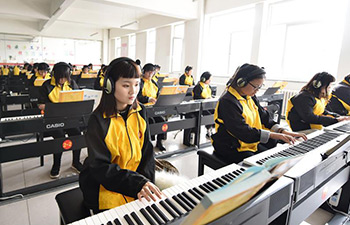BERLIN, Dec. 6 (Xinhua) -- Out of 278 tested products for children, 79 have "serious safety problems", the German product testing foundation (Stiftung Warentest) revealed on Thursday.
In a total of 15 tests that were conducted over the past two years, more than every fourth product had failed and in almost one fifth of all children's products, harmful substances had been responsible for the negative results. "An extremely great nuisance" said Stiftung Warentest CEO Hubertus Primus. The products would harbor "risk of accidents, are contaminated or fail at data security", he added.
Stiftung Warentest was established by the German parliament with the aim of helping consumers by providing impartial and objective information based on the results of comparative investigations of goods and services.
Stiftung Warentest is the most trusted product certificate among German consumers and achieve trust ratings above 75 percent in recent polls.
The German product testers found harmful substances such as boron, naphthalene or formaldehyde in products such as buggies, balancing bikes, colored pencils, play slime and toys. These harmful substances would even be dangerous for adults, since they can irritate skin and mucous membranes, cause allergic reactions, impair fertility or even cause cancer.
Other safety deficiencies also led to poor evaluations of many products. Some high chairs for children would be designed in such a way that children can easily slip out and get their head stuck in the chair. Moreover, Stiftung Warentest laments that half of children's mattresses tested would not meet any standards to prevent children from suffocation. Also, the belts of some children bike seats would be "so laxly secured" that children can easily open the belts themselves.
Besides harmful substances and design flaws, another risk is coming from "smart toys" that use unsecured connections to smartphones. The product testers complain that it would be possible to listen to "unsuspecting" children or even contact them.
Stiftung Warentest wants the European Union to define requirements not only for toys, but for all products used by children. "Here the European legislator is called upon" said Primus. He also appealed to manufacturers to consider the current findings and to regularly monitor the changing regulations for new children's products.













